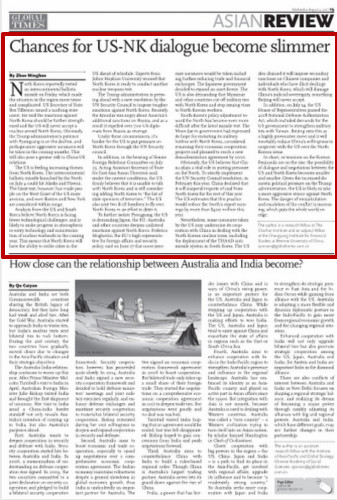Major Power Relations
Your Present Location: PROGRAMS> Major Power RelationsZhao Minghao: Chances for US-NK dialogue become slimmer
By Zhao Minghao Source: Global Times Published: 2017-8-1
North Korea reportedly tested an intercontinental ballistic missile on Friday, which made the situation in the region more tense and complicated. US Secretary of State Rex Tillerson issued a scathing statement. He said the sanctions against North Korea should be further strengthened and the US will never accept a nuclear-armed North Korea.Obviously, the Trump administration`s patience with Pyongyang is on the decline, and perhaps more aggressive measures will be taken in the coming months. This will also pose a greater risk to China-US relations.
The US is feeling increasing threats from North Korea. The intercontinental ballistic missile launched by the North on July 4 could hit Alaska and Hawaii. The latest test, however, has made people on the West Coast of the US more anxious, and even Boston and New York are considered within range.

Analysts from the US and South Korea believe North Korea is facing fewer technological challenges, and is likely to make progress in atmospheric re-entry technology and miniaturization of nuclear warheads in the coming year. This means that North Korea will have the ability to strike cities in the US ahead of schedule. Experts from Johns Hopkins University estimate that a sixth nuclear test could happen at any moment as North Korea possesses more uranium, plutonium and other nuclear weapons materials than ever before.
The Trump administration is pressing ahead with a new resolution by the UN Security Council to impose tougher sanctions against North Korea. Recently, the Kremlin was angry about America`s additional sanctions on Russia, and as a result it expelled over 700 US diplomats from Russia as revenge. Under these circumstances, it`s harder for the US to put pressure on North Korea through the UN Security council.
In addition, in the hearing of Senate Foreign Relations Committee on July 25, Acting Assistant Secretary of State for East Asia Susan Thornton said, under the current conditions, the US firmly believes that it is unable to talk with North Korea and is still considering adding North Korea to "the list of state sponsors of terrorism." The US also sent two B-1B bombers to fly over North Korea in an effort to deter it.
To further isolate Pyongyang, the US is demanding Japan, the EU, Australia and other countries deepen unilateral sanctions against North Korea. Federica Mogherini, the EU`s high representative for foreign affairs and security policy, said on June 17 that more pressure measures would be taken including further reducing trade and financial exchanges. The Japanese government decided to expand an asset freeze. The US is also demanding that Myanmar and other countries cut off military ties with North Korea and stop issuing visas to North Korean workers.
South Korea`s policy adjustment toward the North has become even more difficult after the latest missile test. The Moon Jae-in government had expressed its hope for restarting its military hotline with North Korea, considered resuming their economic cooperation projects and planned to reach a new denuclearization agreement by 2020.
Obviously, the US believes that China plays a vital role in putting pressure on the North. To strictly implement the UN Security Council resolution, in February this year, China declared that it will suspend imports of coal from North Korea for the rest of this year. The US estimates that this practice would reduce the North`s export earnings by more than $400 million this year.
Nevertheless, some measures taken by the US may undermine its cooperation with China in dealing with the North Korean nuclear issue, including the deployment of the THAAD anti-missile system in South Korea. The US also claimed it will impose secondary sanctions on Chinese companies and individuals who have illicit dealings with North Korea, which will damage China`s judicial sovereignty, something Beijing will never accept. In addition, on July 14, the US House of Representatives passed the 2018 National Defense Authorization Act, which included demands for the US government to strengthen military ties with Taiwan. Beijing sees this as a highly provocative move and it will inevitably reduce China`s willingness to cooperate with the US over the North Korean issue.
In short, as tensions on the Korean Peninsula are on the rise, the possibility of dialogue and negotiation between the US and North Korea becomes smaller and smaller. Given the increased domestic political pressure on the Trump administration, the US is likely to take a more aggressive stance against North Korea. The danger of miscalculation and escalation of the conflict is increasing, which puts the whole world on edge.
The author is an adjunct fellow at the Chongyang Institute for Financial Studies at Renmin University of China.
Key Words: North Korea;US;China;Zhao Minghao























































































 京公网安备 11010802037854号
京公网安备 11010802037854号





